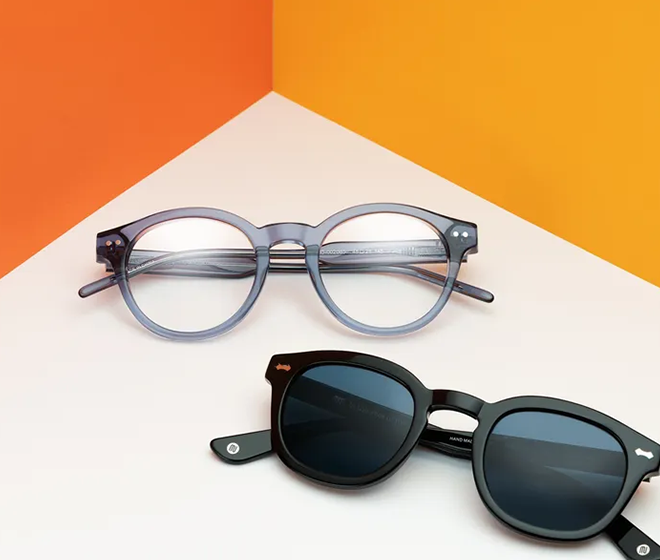Abouts
Glasses, also known as eyeglasses or spectacles, are devices worn on the face to improve vision or protect the eyes. They consist of two lenses mounted in a frame that sits on the nose and ears. The lenses can be made of different materials, including glass, plastic, or polycarbonate.
Glasses are used to correct a variety of vision problems, such as nearsightedness (myopia), farsightedness (hyperopia), astigmatism, and presbyopia. The lenses in the glasses refract light in a way that helps the eyes focus properly and see more clearly.
There are many types of glasses available, including reading glasses, single vision glasses, bifocal glasses, and progressive glasses. Glasses can also be made with different types of coatings and tints to enhance their functionality and protect the eyes from harmful UV rays.
Some people choose to wear glasses for fashion or style purposes, even if they do not have a vision problem. Glasses can be a fun accessory and come in a wide range of styles, colors, and designs to match different personalities and preferences.
The Pros and Cons of Prescription Glasses vs Sunglasses

Prescription glasses and sunglasses both serve different purposes, and they each have their own pros and cons. Here are some of the key factors to consider:
Prescription Glasses:
Pros:
- Improve vision: Prescription glasses are designed to correct refractive errors, which can improve your vision and reduce eye strain.
- Versatile: Prescription glasses can be customized to fit your individual needs and can be worn in a variety of settings, such as work, school, or home.
- Wide range of options: There are many different types of prescription glasses available, including single vision, bifocal, and progressive lenses, and different lens coatings and materials.
Cons:
- Limited sun protection: Prescription glasses do not typically provide adequate protection from the sun’s harmful UV rays, which can increase the risk of eye damage and disease.
- Can be expensive: Prescription glasses can be costly, especially if you require specialized lenses or frames.
- May not be suitable for outdoor activities: If you engage in outdoor activities, such as sports or hiking, prescription glasses may not be the best option, as they can be prone to slipping and sliding.
Sunglasses:
Pros:
UV protection: Sunglasses are designed to protect your eyes from the sun’s harmful UV rays, which can help reduce the risk of eye damage and disease.
Enhance visual comfort: Sunglasses can reduce glare and improve visual comfort in bright sunlight or snowy conditions.
Can be stylish: Sunglasses come in a wide range of styles and colors, making them a popular fashion accessory.
Cons:
- Limited functionality: Sunglasses are primarily designed for sun protection and may not be suitable for indoor use or nighttime activities.
- Can be expensive: High-quality sunglasses can be expensive, especially if you opt for designer brands.
- Prescription limitations: If you require corrective lenses, you may need to purchase prescription sunglasses, which can be more costly than non-prescription options.
How to Clean Your Glasses and Keep Them Looking New

Cleaning your glasses regularly is important to keep them looking new and to ensure that you have clear vision. Here are some steps to follow to clean your glasses properly:
- Wash your hands: Before touching your glasses, wash your hands with soap and water to remove any dirt or bacteria.
- Rinse your glasses: Rinse your glasses under a stream of lukewarm water to remove any dirt, dust, or debris. Avoid using hot water, as it can damage the lenses or coatings.
- Apply cleaning solution: Apply a small amount of cleaning solution or lens cleaner to each lens. Avoid using harsh chemicals or household cleaners, as they can damage the lenses or coatings.
- Gently clean the lenses: Use a soft, lint-free cloth or microfiber cloth to gently clean each lens in a circular motion, starting from the center and working your way outward. Avoid using paper towels, tissues, or clothing, as they can scratch the lenses.
- Clean the frames: Use a soft cloth or microfiber cloth to clean the frames and nose pads. If the frames are especially dirty, you can use a mild soap and water to clean them, but avoid getting the lenses wet.
- Dry your glasses: Use a dry, lint-free cloth or microfiber cloth to dry your glasses. Avoid using a towel or clothing, as they can leave lint or scratches on the lenses.
- Store your glasses: When not in use, store your glasses in a protective case to prevent scratches and damage.
In addition to regular cleaning, there are some tips to keep your glasses looking new:
- Avoid touching the lenses with your fingers, as they can leave fingerprints or smudges.
- Avoid exposing your glasses to extreme temperatures or humidity, as it can damage the lenses or coatings.
- Avoid using abrasive or rough materials to clean your glasses, as they can scratch the lenses or frames.
- Have your glasses adjusted regularly by an optician to ensure a proper fit and prevent damage.
How to Pick the Perfect Pair of Glasses for Your Face
Choosing the perfect pair of glasses for your face can be a daunting task. Here are some tips to help you pick a pair that complements your face shape:
- Determine your face shape: Determine your face shape by measuring the width of your forehead, cheekbones, and jawline. The four basic face shapes are round, square, oval, and heart-shaped.
- Consider your features: Consider your features, such as the size of your nose, eyes, and eyebrows. This will help you choose a pair of glasses that will complement your features and balance your face.
- Choose a frame style: Choose a frame style that complements your face shape. For example, round frames work well on square faces, while square frames work well on round faces. Oval frames are versatile and work well on most face shapes.
- Consider the frame size: Choose a frame size that fits your face properly. The frame should be wide enough to fit your face without being too large or too small.
- Choose the right color: Choose a frame color that complements your skin tone and hair color. Neutral colors, such as black, brown, or gray, are versatile and work well with most skin tones and hair colors.
- Consider your lifestyle: Consider your lifestyle and choose a pair of glasses that suits your needs. If you are active, choose a pair of glasses that are lightweight and durable. If you spend a lot of time outdoors, choose a pair of glasses that offer UV protection.
- Try on different styles: Finally, try on different styles and shapes of glasses to find the perfect pair for your face. Don’t be afraid to ask for feedback from friends, family, or the optician. Choose a pair of glasses that you feel comfortable wearing and that make you feel confident.
The Benefits of Wearing Prescription Glasses

Wearing prescription glasses has many benefits, including:
- Improved vision: Prescription glasses are designed to correct refractive errors, such as nearsightedness, farsightedness, and astigmatism. Wearing prescription glasses can improve your vision and reduce eye strain, allowing you to see clearly and comfortably.
- Better safety: Wearing prescription glasses can improve safety, especially when driving or operating machinery. Improved vision can help you react more quickly to potential hazards and avoid accidents.
- Reduced eye strain: If you spend a lot of time in front of a computer or other digital devices, wearing prescription glasses can reduce eye strain and fatigue. Prescription glasses can also help prevent headaches and neck pain caused by eye strain.
- Enhanced comfort: Wearing prescription glasses can enhance comfort, especially if you have a high prescription or complex vision needs. Prescription glasses can be customized to fit your individual needs and preferences, ensuring a comfortable and enjoyable wearing experience.
- Improved confidence: Wearing prescription glasses can improve confidence, especially if you have previously felt self-conscious about your vision. Wearing glasses can be a fashion statement and a way to express your personal style.
- Protection from UV rays: Prescription glasses can be designed to provide protection from the sun’s harmful UV rays, reducing the risk of eye damage and disease.
Overall, wearing prescription glasses can improve your vision, safety, comfort, and confidence, and can help you enjoy a better quality of life.
The Best Glasses for Outdoor Activities
When it comes to outdoor activities, it’s important to choose glasses that offer both protection and performance. Here are some types of glasses that are best suited for various outdoor activities:
- Sunglasses with polarized lenses: Sunglasses with polarized lenses are ideal for outdoor activities such as fishing, boating, and beach sports. Polarized lenses reduce glare and provide better clarity and contrast, making it easier to see objects in the water or on land.
- Wrap-around sunglasses: Wrap-around sunglasses are perfect for outdoor activities such as running, cycling, and hiking. They provide maximum coverage and protection from the sun’s harmful UV rays, wind, and debris.
- Sport-specific sunglasses: For activities such as golfing, tennis, and skiing, sport-specific sunglasses are designed to enhance performance and visibility. They often feature specialized lenses that enhance contrast, reduce glare, and improve depth perception.
- Photochromic lenses: Photochromic lenses are ideal for outdoor activities that involve varying light conditions, such as hiking or mountain biking. These lenses darken in bright sunlight and lighten in low light, adapting to changing conditions and providing optimal vision.
- Prescription sunglasses: If you require prescription glasses, consider getting prescription sunglasses for outdoor activities. These glasses provide clear vision while also protecting your eyes from the sun’s harmful UV rays.
When choosing glasses for outdoor activities, be sure to choose glasses that are comfortable, durable, and provide the level of protection and performance you need for your specific activity. Look for glasses with high-quality lenses and frames that can withstand the demands of outdoor sports and activities.
How to Avoid Unsightly Marks from Wearing Glasses

Wearing glasses for long periods of time can sometimes leave unsightly marks on the nose and around the ears. Here are some tips to help you avoid these marks:
Adjust your glasses: Adjust your glasses to ensure they are sitting properly on your face. Glasses that are too tight or too loose can cause pressure points and leave marks on the skin.
Clean your glasses regularly: Dirt, oil, and sweat can build up on your glasses, causing them to slip and slide on your face. Clean your glasses regularly with a microfiber cloth and lens cleaner to keep them free of debris.
Use silicone nose pads: Silicone nose pads can help distribute the weight of your glasses more evenly, reducing pressure on the nose and preventing marks.
Try different materials: Some materials, such as acetate or titanium, are more lightweight and comfortable than others, such as metal. Consider trying different frame materials to see what works best for you.
Take breaks: If you’re wearing glasses for long periods of time, take regular breaks to give your skin a break. Remove your glasses and gently massage the areas where marks have formed.
Use a skin protectant: Apply a skin protectant, such as petroleum jelly or lanolin, to the areas where your glasses come into contact with your skin. This can help reduce friction and prevent marks from forming.
By following these tips, you can avoid unsightly marks from wearing glasses and enjoy a more comfortable wearing experience.
The Ultimate Guide to Caring for Your Glasses

Caring for your glasses is important to ensure they last a long time and provide you with clear vision. Here is the ultimate guide to caring for your glasses:
- Clean your glasses regularly: Use a microfiber cloth and lens cleaner to clean your glasses at least once a day. This will remove dirt, dust, and oils from your lenses, ensuring clear vision.
- Handle your glasses with care: When taking your glasses off or putting them on, use both hands and handle them gently to avoid bending or breaking the frames.
- Store your glasses properly: Store your glasses in a protective case when you’re not wearing them to prevent scratches and damage.
- Avoid hot water: Avoid exposing your glasses to hot water or steam, as this can damage the coatings on the lenses.
- Avoid abrasive materials: Don’t use abrasive materials, such as paper towels or tissues, to clean your glasses, as this can scratch the lenses.
- Have your glasses adjusted regularly: Visit your optician to have your glasses adjusted regularly to ensure they fit properly and are comfortable to wear.
- Use a retainer strap for sports: If you’re participating in sports or other physical activities, use a retainer strap to keep your glasses secure and prevent them from falling off.
- Replace damaged or scratched lenses: If your lenses become scratched or damaged, have them replaced by a professional to ensure clear vision.
- Protect your glasses from the sun: If you’re wearing prescription glasses, consider getting prescription sunglasses or clip-on sunglasses to protect your eyes from the sun’s harmful UV rays.
By following these tips, you can care for your glasses and ensure they provide you with clear vision for years to come.
How to Choose the Right Glasses for Your Lifestyle
Choosing the right glasses for your lifestyle is important to ensure they are comfortable to wear and meet your specific needs. Here are some factors to consider when choosing glasses for your lifestyle:
- Work environment: If you work in an office or spend a lot of time in front of a computer, consider glasses with lenses that reduce blue light exposure to reduce eye strain and fatigue. If you work in a hazardous environment, such as a construction site or factory, consider safety glasses that meet industry standards.
- Hobbies and activities: If you enjoy outdoor activities, such as hiking or skiing, consider glasses with polarized lenses that reduce glare and provide UV protection. If you play sports, consider glasses with impact-resistant lenses and a secure fit.
- Fashion preferences: Glasses come in a variety of styles and colors, so choose a pair that reflects your personal style and complements your wardrobe.
- Prescription needs: If you require prescription glasses, choose a pair that meets your specific needs. For example, if you have a strong prescription, choose glasses with high-index lenses that are thinner and lighter.
- Comfort: Choose glasses that fit well and are comfortable to wear. Look for glasses with adjustable nose pads, lightweight materials, and a secure fit.
- Budget: Glasses can range in price from affordable to high-end, so choose a pair that fits your budget. Keep in mind that higher-priced glasses often have features such as anti-glare coatings and scratch-resistant lenses.
By considering these factors, you can choose glasses that meet your specific lifestyle needs and provide you with clear vision and comfort. Don’t be afraid to try on different styles and ask for advice from your optician.
Styling Tips for Rocking Glasses on a Night Out
Glasses can be a great accessory to add to your outfit for a night out. Here are some styling tips for rocking glasses on a night out:
Choose the right frames: Choose frames that complement your face shape and enhance your features. Consider the color of your outfit and choose frames that match or contrast with it.
Coordinate with your outfit: Coordinate your glasses with your outfit to create a cohesive look. If you’re wearing a bold outfit, consider wearing more subtle glasses, and if you’re wearing a simple outfit, consider wearing glasses with a pop of color.
Play with makeup: Glasses can enhance your makeup, so play with your makeup to make your eyes pop. Use mascara and eyeliner to define your eyes and consider wearing eyeshadow that complements your frames.
Add accessories: Accessorize your glasses with earrings, necklaces, and bracelets to create a complete look. Choose accessories that complement your glasses and outfit.
Consider your hairstyle: Consider your hairstyle when choosing glasses for a night out. If you have long hair, consider wearing glasses with thin frames to avoid tangling, and if you have short hair, consider wearing glasses with bold frames to create a statement.
Have fun with it: Don’t be afraid to have fun with your glasses and experiment with different styles. Glasses can be a fun and stylish accessory to add to your outfit for a night out.
By following these styling tips, you can rock your glasses on a night out and create a stylish and cohesive look. Remember to have fun with it and choose frames that make you feel confident and comfortable.
The Pros and Cons of Wearing Glasses vs. Contacts
Both glasses and contact lenses have their advantages and disadvantages. Here are some pros and cons of wearing glasses vs. contacts:
Pros of wearing glasses:
Easy to use: Glasses are easy to use and require minimal maintenance.
Safe: Glasses do not require touching your eyes, which can reduce the risk of eye infections.
Stylish: Glasses come in a variety of styles and can enhance your overall appearance.
Protection: Glasses can provide protection from UV rays, dust, and debris.
Cons of wearing glasses:
Can be uncomfortable: Glasses can be uncomfortable, especially if they don’t fit properly.
Can fog up: Glasses can fog up in humid or cold environments.
Can interfere with sports and other activities: Glasses can interfere with some sports and other activities, especially if they are not secured properly.
Pros of wearing contacts:
Improved vision: Contacts can provide better peripheral vision than glasses.
Convenient: Contacts are convenient and don’t interfere with sports or other activities.
Comfortable: Contacts are comfortable and provide a natural vision experience.
Can enhance appearance: Contacts can enhance your appearance and provide a more natural look.
Cons of wearing contacts:
Require more maintenance: Contacts require more maintenance than glasses.
Can cause eye irritation: Contacts can cause eye irritation and dryness, especially if they are not fitted properly or are worn for long periods.
More expensive: Contacts are typically more expensive than glasses.
Can be lost or damaged: Contacts can be easily lost or damaged, which can be costly to replace.
Overall, both glasses and contacts have their pros and cons. The best option for you will depend on your lifestyle, budget, and personal preferences. It’s always best to consult with your eye care provider to determine the best option for your needs.
Affordable Glasses: The Best Places to Buy Them

If you’re looking for affordable glasses, here are some of the best places to buy them:
Zenni Optical: Zenni Optical offers a wide variety of affordable glasses starting at just $6.95. They offer a range of styles, colors, and lenses, making it easy to find glasses that fit your budget and style.
Warby Parker: Warby Parker offers stylish and affordable glasses starting at just $95, including prescription lenses. They also offer a home try-on program, allowing you to try on up to five pairs of glasses before making a purchase.
EyeBuyDirect: EyeBuyDirect offers a wide variety of affordable glasses starting at just $6. They offer a range of styles, colors, and lenses, and also offer a virtual try-on tool to help you find the perfect pair.
Coastal: Coastal offers affordable glasses starting at just $19, including prescription lenses. They offer a range of styles and brands, making it easy to find glasses that fit your budget and style.
GlassesUSA: GlassesUSA offers a wide variety of affordable glasses starting at just $38, including prescription lenses. They offer a range of styles and brands, and also offer a virtual try-on tool to help you find the perfect pair.
By shopping at these affordable glasses retailers, you can find a pair of glasses that fit your budget and style without compromising on quality. Remember to always consult with your eye care provider to ensure that the glasses you choose are the right prescription for your eyes.
FAQ

Sure, here are some frequently asked questions (FAQs) about glasses:
What are the different types of lenses for glasses?
Single vision lenses: these lenses have the same prescription throughout and are typically used for nearsightedness or farsightedness.
Bifocal lenses: these lenses have two different prescriptions in one lens and are typically used for presbyopia.
Trifocal lenses: these lenses have three different prescriptions in one lens and are typically used for presbyopia.
Progressive lenses: these lenses gradually change from distance to near vision, providing a natural visual experience.
How often should I get new glasses?
It’s recommended to get new glasses every two years or as recommended by your eye care provider. However, if you notice changes in your vision or if your glasses become damaged or uncomfortable, you should get new glasses as soon as possible.
How do I know if my glasses fit properly?
Your glasses should fit comfortably and securely on your face, without sliding or pressing too hard. The frames should also be centered on your face, with the lenses positioned correctly over your eyes. It’s recommended to get your glasses fitted by a professional to ensure proper fit.
Can I wear my glasses when playing sports?
Yes, you can wear glasses when playing sports, but it’s important to choose frames and lenses that are designed for sports and will stay securely on your face. Alternatively, you can consider wearing contact lenses or prescription sports goggles.
Can I wear glasses with a face mask?
Yes, you can wear glasses with a face mask, but it’s important to ensure a secure fit to prevent fogging. You can try adjusting the fit of your glasses or using anti-fog solutions or products to prevent fogging.
Conclusion

In conclusion, glasses are a popular and practical solution for correcting vision problems and protecting eyes from harmful UV rays. From picking the perfect pair for your face shape to caring for them properly, there are many factors to consider when it comes to glasses. Whether you prefer prescription glasses or sunglasses, there are a wide variety of styles and brands available to fit your budget and lifestyle. With proper care and maintenance, glasses can last for years and provide clear, comfortable vision for all your daily activities.

